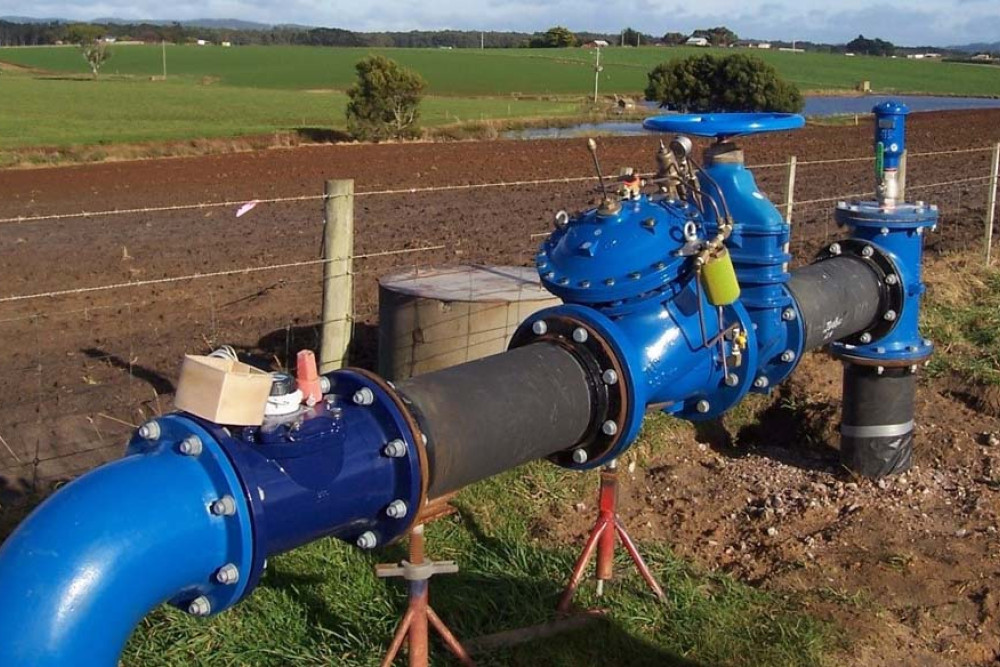On The Land
18 February, 2024
New legislation flows on to local irrigators
IRRIGATORS in the region are advised to check their existing water meters to see if they will still meet new legislative standards.

A national roll-out of the new legislation will see each state/area having a different deadline or implementation program.
The new national legislation requires water meters to be both supplied and installed within strict guidelines encompassed in Australian pattern approval NMI-M10.
The common standards compliance legislation applies to all Australian states and requires all non-urban water that is measured by State governments to comply with the National Measurement Institute (NMI) installation regulations.
Some irrigators may already have meters in place which have been validated and meet the new standards, while others may not.
Water Dynamics irrigation and water resources authority Andrew Heslin has an extensive background in irrigation and water management and holds a number of formal qualifications in water management, irrigation, HSE, and risk management.
Prior to joining Water Dynamics, Andrew spent 13 years at Goulburn Murray Water in a number of roles, installing water meters and working in corporate services. He has had five years’ experience as a Tafe sessional teacher of irrigation.
“As deadlines roll out for compliance with non-urban water metering obligations in different areas, there are tens of thousands of farmers and food producers affected,” he said.
“Non-urban water metering refers to water taken from regulated rivers, unregulated rivers, and groundwater systems under a water access licence, where the take can be measured by a meter.
“The reasoning is, if you can't measure and monitor it, you can't manage it and optimise use.”
The sustainable management of Queensland’s water resources is vital for supporting social, cultural, economic and environmental outcomes.
Access to water is a key driver for economic growth and job opportunities for regional communities.
As the regulator of Queensland’s non-urban water resources, the Department of Regional Development, Manufacturing and Water (DRDMW) is responsible for managing these resources to ensure water users can access their fair share, today and into the future.
Water meter technology has advanced and some manufacturers have had their meters certified by the National Measurement Institute.
This certification provides greater confidence for users and DRDMW in that the meter has been tested and is accredited to provide accurate meter reads.
This provides significant and far-reaching benefits.
Water users know how much water they use and can improve their water use efficiency and reduce operational costs.
Government departments can also be better informed regarding how much water is being used across Queensland, assisting to make better water planning decisions about the resource.
More water can subsequently be made available in areas to support business, with better data ensuring that environmental water needs can be sustainably managed.
Additional information allows for compliance action to be taken to address misuse, so all users can be confident that water is being used sustainably.
“Given population growth and the need for food export growth in Australia, it is widely expected that the agricultural sector here will have to expand the use of irrigation over the years ahead,” Andrew said.
“This will become even more important as we have now entered the El Nino phase of our climate patterns which is predicted to ultimately result in drier conditions in the years ahead.
“We are very fortunate on a world scale that Australia produces much more food than it consumes, exporting around 70% of agricultural production.
“But competition for water resources is growing in many regions and, in response, planning bodies are focussed on improving water productivity in agriculture so there is enough to satisfy expanding demand in all areas.
“This was one of the reasons the Federal government is working with States to establish common standards of accurate non-urban water metering compliance.”
Irrigators are advised that for a meter to be considered an approved meter, it must be validated by a certified meter installer (CMI) accredited by Irrigation Australia Limited who will issue a Meter Validation Certificate, which must then be submitted to DRDMW.
Water entitlement holders will be notified 12 months beforehand by DRDMW in the lead up to the policy being implemented in their area to advise them if they need to install a new water meter or if their existing meters need to be revalidated to meet the current metering standards.
There will be no change to the metering requirements that currently apply to water users until the policy is implemented. This includes meter revalidation.
If the entitlement holder continues to take water through works without a validated meter attached, this will be an offence under the Water Act 2000 and penalties apply.
For more information, phone Queensland Government 13 74 68 (new meter installs and meter validations) or waterdynamics.com.au or www.irrigationaustralia.com.au


